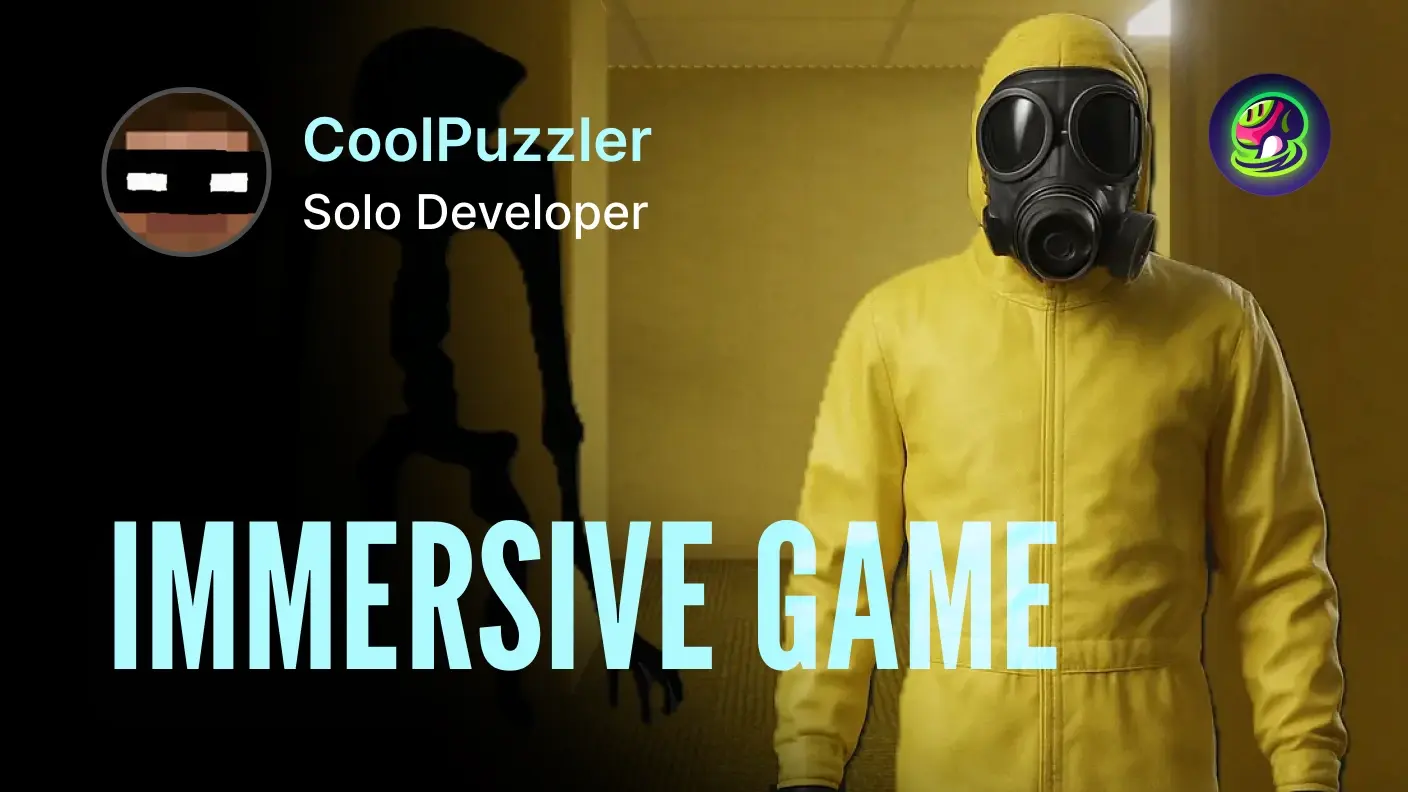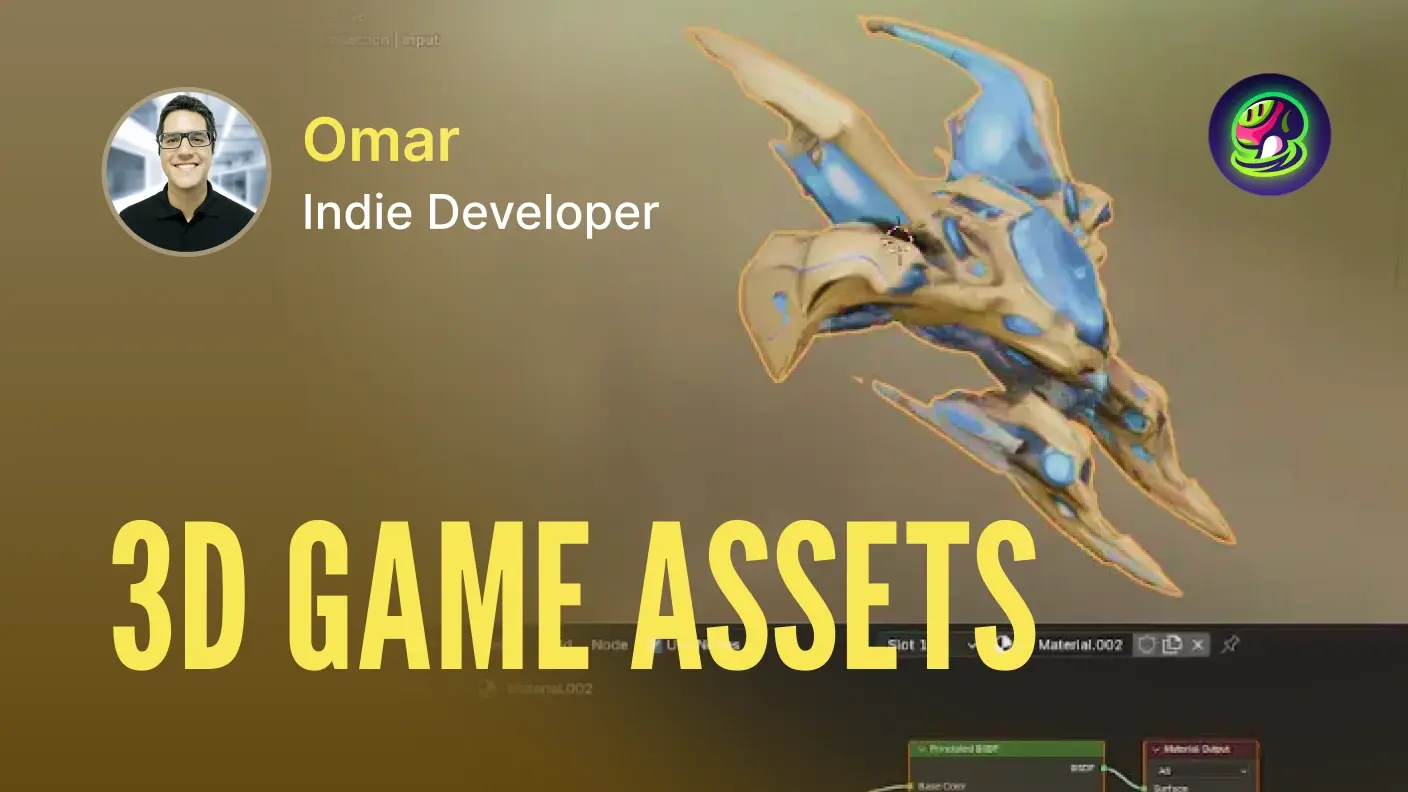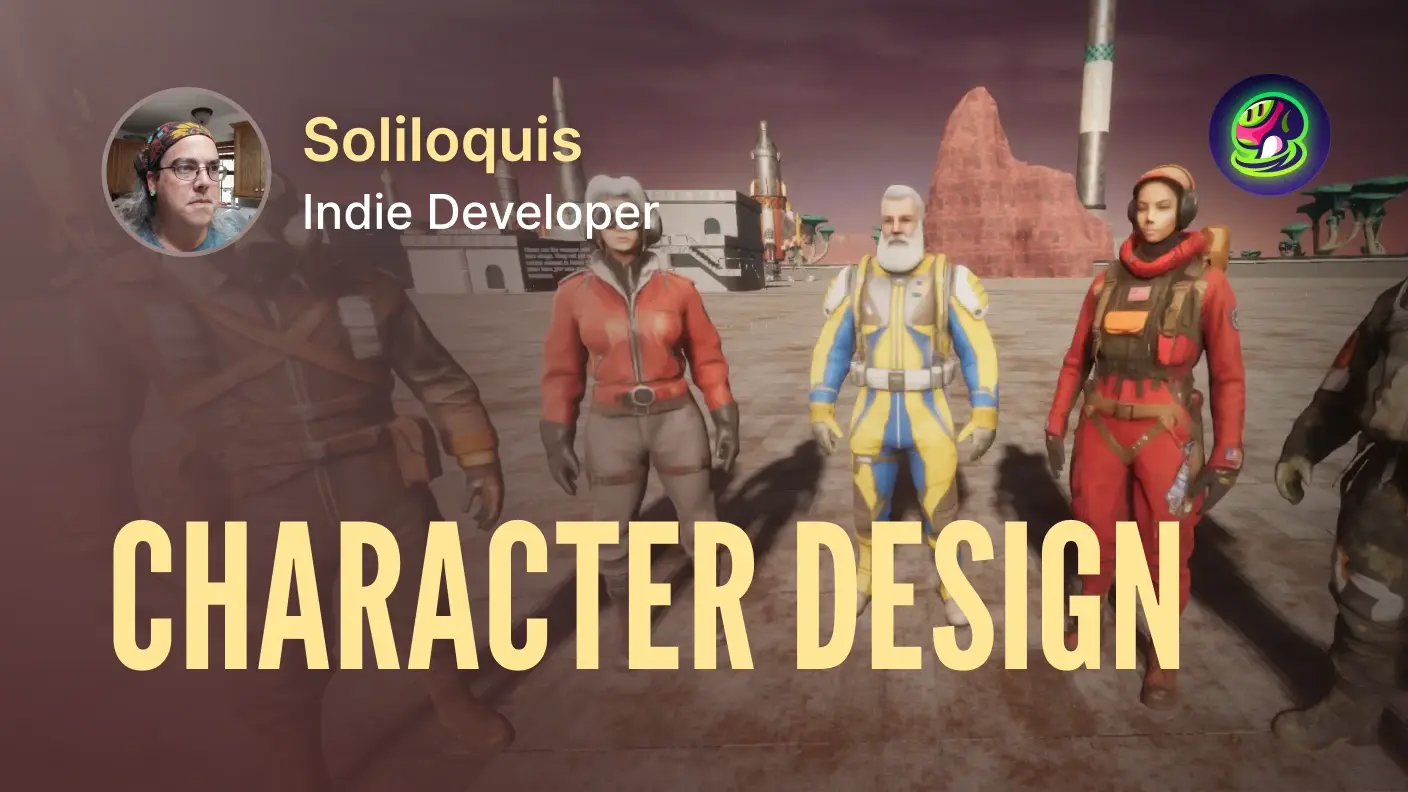Axx is a solo indie developer chasing a childhood dream: building his first large-scale surreal 3D platformer. Inspired by classics like Donkey Kong 64, Spyro, and Super Mario 64, he envisioned a world where players take on the role of a robotic cat—exploring strange biomes crafted by an AI that “fails” to reconstruct human reality (think cacti morphing into antenna towers or snow falling in deserts).
Unreal Engine's Blueprint system solved his programming struggles, but a critical roadblock remained: 3D asset creation. Axx tried learning traditional 3D modeling but quickly realized he lacked the talent, leaving his game world trapped in his imagination. That changed when he discovered Meshy AI—a tool that would redefine his development journey.
"Before starting, I tried to learn traditional 3D modeling but quickly realized I had no talent for it. That's why Meshy has been such a huge help — it allows me to focus on design and creativity instead of struggling with polygons."
Axx
Solo Indie Developer
Axx's Biggest Challenges: Asset Bottlenecks + the “AI-Only” Rule
Before Meshy, Axx faced two seemingly insurmountable hurdles that threatened to derail his project:
1. Crippling 3D Asset Creation Bottlenecks
Traditional 3D modeling was a dead end for Axx. Without the skill to craft meshes, textures, or animations manually, he couldn't progress past the “idea stage”—every attempt to build assets left him frustrated and stuck, slowing his entire development process to a halt.
"My biggest challenge was asset creation. I tried learning 3D modeling, but I wasn't good at it and it blocked my progress. Meshy completely removed that bottleneck and made it possible for me to actually build the game world."
Axx
Solo Indie Developer
2. The “AI-Only” Rule: Ambition vs. Tool Limitations
Axx set a strict creative guideline: everything in the game (meshes, textures, music, sound effects) must be AI-generated. He wanted to push the boundaries of AI in game dev and align the project with modern tech trends—but without a reliable AI tool for 3D assets, this rule felt like a constraint, not a creative choice.
How Meshy Solved Axx's Problems: No More Barriers, Just Creativity
Meshy didn't just help Axx—it became the backbone of his project, addressing every core challenge and aligning with his vision:
Eliminated Asset Bottlenecks (in Minutes, Not Days)
Unlike Blender or other 3D tools that require months of training, Meshy lets Axx generate high-quality 3D assets (and animations) with simple prompts or reference images. What once took days to build manually now takes minutes—freeing him to focus on design, not polygons.
![]()
Perfectly Aligned with the “AI-Only” Rule
Meshy's ability to generate PBR textures (especially with Meshy 5) meant Axx could stick to his “AI-only” promise without compromising quality. Even better: Meshy's “imperfect” outputs (distorted shapes, unexpected details) became a strength—they matched his game's surreal, AI-flawed aesthetic, turning “mistakes” into intentional design.
Boosted Efficiency for a Part-Time Solo Dev
Meshy's speed let Axx prototype environments and gameplay ideas in hours, not weeks. He could test, refine, and iterate on levels quickly—something impossible when stuck on asset creation. This efficiency gave him the freedom to experiment with worldbuilding, a luxury he never had before.
"Meshy allowed me to actually build the game I had in mind, instead of getting stuck on 3D modeling. It improved the speed of prototyping enormously — I can generate, clean up, and integrate assets in minutes instead of days."
Axx
Solo Indie Developer
Community Support to Beat Solo Isolation
Meshy's Discord server (and Creator Hangouts) gave Axx confidence to share his work—even though English isn't his first language. The community's feedback and encouragement helped him step out of his comfort zone, turning solo development from a lonely process into a collaborative one.
Axx's Step-by-Step Meshy Workflow: From Prompt to Unreal Engine
Axx built a detailed, repeatable workflow that integrates Meshy with other AI tools and Unreal Engine 5—ensuring he stays true to his “AI-only” rule while keeping development fast.
"I work solo with Unreal Engine 5, Meshy.ai for 3D assets and animations, ChatGPT for brainstorming and refining prompts, Suno.ai for AI-generated music, and other tools for sound and video."
Axx
Solo Indie Developer
Here's exactly how he does it:
Step 1: Generate Reference Images with ChatGPT
First, Axx uses ChatGPT to write precise prompts for his desired asset. ChatGPT generates reference images that act as a visual guide for Meshy.
Step 2: Generate 3D Assets in Meshy
He pastes the ChatGPT prompt (or reference image) into Meshy, then selects the best-generated asset. Even “weird” outputs work—they fit his game's surreal vibe. With Meshy 5, he skips tools like Materialize entirely, as Meshy now generates PBR textures directly.
![]()
Step 3: Prep Assets in Unreal Engine 5
- Import & Rescale: Axx imports the Meshy asset into Unreal and resizes it to fit his game world.
- Modeling Mode (Shift+5) Adjustments:
- Bake Transform: Locks in the asset's position/rotation to avoid placement issues.
- Edit Pivot: Adjusts the asset's pivot point (e.g., a platform's pivot at its base for smooth movement).
- Simplify (If Needed): Reduces polygon count to boost game performance, without losing key details.
Step 4: Set Up Collision (Critical for Gameplay)
Axx prioritizes Simple Collision (for performance) when available. For irregular, surreal assets, he creates Custom Collision to ensure players interact with the asset smoothly.
Step 5: Fine-Tune Materials in Unreal's Material Editor
- Sets Specular = 0 to match the game's muted, surreal look (reduces unwanted shine).
- Connects Meshy's PBR textures (albedo, normal, roughness, metallic) to the right nodes—enhancing details like depth from the normal map.
Step 6: Fix Special Cases (Camera Collision + Transparency)
- Camera Collision: Disables it for small/decorative assets to prevent camera glitches.
- Transparency: Uses dithering (not alpha blending) for AI-glitched objects—creates natural-looking transparency that fits the game's style.
Step 7: Integrate Other AI Tools (For “AI-Only” Compliance)
Meshy is the core, but Axx pairs it with other AI tools to complete his workflow:
- Meshy.ai: 3D assets and animations
- ChatGPT: prompt engineering / image creation
- Suno.ai: music
- Elevenlabs.io: sound effects
- Audio converter: converting into .wav format
- Instant background remover: create transparent PNGs
- Materialize: generate PBR textures (not needed anymore since Meshy 5)
- Hailuo.ai and Kling.ai: video sequences for cutscenes
- DaVinci Resolve: video editing
- skybox.blockadelabs.com: AI-generated skyboxes
Results: Axx's Game Is Now Tangible—Thanks to Meshy
Meshy didn't just fix Axx's problems—it transformed his project from a dream into a playable game.
"Meshy was essential — without it, this project simply wouldn't exist. It turned what felt impossible into something I can actually build."
Axx
Solo Indie Developer
Here's what he's achieved:
Development Speed: Days of Work → Minutes
Axx's workflow is faster with Meshy. He prototypes entire biome sections in hours, iterates on level design quickly, and never gets stuck on asset creation. This speed let him move from “idea” to “playable demo” in record time.
![]()
“AI-Only” Rule: Fully Achieved (With Style)
Meshy's “imperfect” assets make the world feel more surreal and unique—setting it apart from other indie platformers.
"Even when Meshy generates distorted or weird results, they fit seamlessly into my game. Those “mistakes” become part of the style, reinforcing the idea that the world itself is an AI's flawed attempt at recreating reality."
Axx
Solo Indie Developer
Overwhelmingly Positive Playtest Feedback
Playtesters love the game's one-of-a-kind aesthetic (a direct result of Meshy's assets) and have shared valuable ideas for mechanics Axx hadn't considered. The feedback has validated his creative choices and boosted his confidence in the project.
Expectations and Suggestions: Axx's Game Expansion and Advice for Fellow Developers
Future Plans for the Game
Axx's primary focus moving forward is to expand the game's lore, deepening the story of the AI-created world and the robotic cat's mission. He also plans to mix multiple biomes together, creating more complex and diverse game environments that challenge players' exploration skills.
Drawing inspiration from Metroidvania games, he wants to incorporate elements like interconnected world maps, hidden paths, and power-ups that unlock new areas—adding depth and replayability to the 3D platformer formula.
Suggestions for Other Solo/Indie Developers
- Step Out of Your Comfort Zone: AI tools like Meshy aren't replacements for creativity—they're amplifiers. Even if you're used to traditional workflows, give them a try. Don't be afraid to step out of your comfort zone. Try unconventional things, even if it feels risky. You might be surprised at how much you grow creatively.
"Yes — impostor syndrome is normal, but it shouldn't stop you. Sharing your work and experimenting outside of your comfort zone will help you grow, even if it feels uncomfortable at first."
Axx
Solo Indie Developer
- Prioritize Your Vision: AI should serve your creative goals, not the other way around. Meshy let Axx build his game—now go build yours.
"Personally, I think what really matters in the end is the experience: if a game is fun, if a film moves you, or if music sounds good, then it has achieved its purpose."
Axx
Solo Indie Developer
Ever wished you could skip the 3D modeling grind and jump straight to building the game world in your head? For solo devs like Axx, Meshy AI turned that wish into reality. Don't let polygons block your creativity; give Meshy a go, and let your game move from idea to demo faster than you think.


